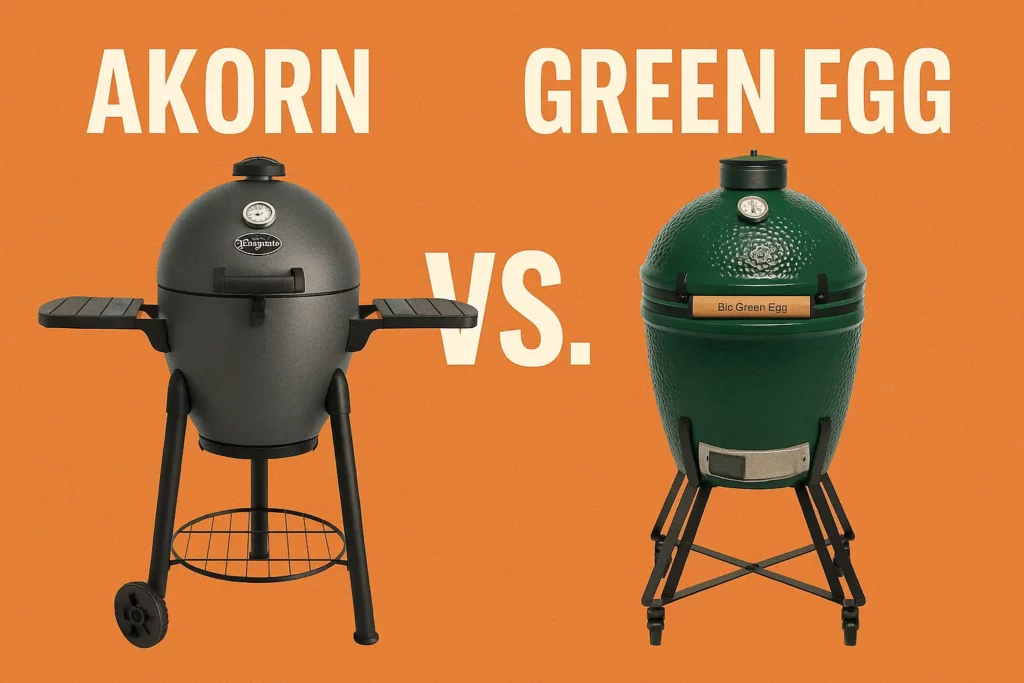This post may contain affiliate links. If you use these links to buy something we may earn a small commission. Thanks.
Grilling enthusiasts know that choosing the right grill is essential for perfecting their BBQ skills. With so many options on the market, it can be challenging to pick the best grill for your needs. Among the most popular choices are the Akorn and the Green Egg. These two grills, while both known for their excellent performance and versatility, differ significantly in design, construction, and features. In this article, we’ll break down the key differences and similarities between Akorn and Green Egg grills to help you determine which one is right for you.
Introduction
The Akorn and Green Egg represent two different categories in the grilling world. The Akorn, typically a steel body with porcelain coating, offers a budget-friendly option with good performance, while the Green Egg is a premium ceramic grill, often regarded as the “Cadillac” of BBQ grills. Both have their merits, but how do they stack up when compared side by side?
In this article, we’ll explore the design, cooking performance, fuel usage, versatility, and other key features to provide you with a comprehensive understanding of these two popular grills. Whether you are a beginner or an experienced pitmaster, understanding the differences between these grills will help you make an informed decision.





Design and Build Quality
Akorn
The Akorn grill is constructed from steel, which makes it lighter than ceramic grills. This lightweight design provides portability and ease of use, which is a huge plus for those who want to take their grill on the go. The body is coated with a porcelain enamel finish, which adds durability and provides some level of heat retention. However, it does not match the heat retention capabilities of ceramic grills like the Green Egg.
- Material: Steel with porcelain coating.
- Weight: Lighter compared to the Green Egg, making it more portable.
- Durability: The steel body is relatively durable but may not last as long as ceramic grills if not properly maintained. It is also more prone to rust over time.
Green Egg
The Green Egg is constructed from high-quality ceramic (known as kamado-style clay), which gives it exceptional heat retention. This dense material helps maintain consistent temperatures, even during long cooking sessions. The ceramic construction also provides a more even heat distribution, which is vital for achieving the perfect BBQ. However, this comes at the expense of weight and portability, as Green Eggs can be quite heavy and bulky.
- Material: Premium ceramic (Kamakuro-style clay).
- Weight: Much heavier than the Akorn, which makes it less portable.
- Durability: Ceramic grills are incredibly durable and can last for decades with proper care. They are resistant to weathering and rust, making them a long-term investment.
Cooking Performance
Akorn
When it comes to cooking performance, the Akorn offers good heat retention and can reach temperatures ranging from 225°F to 700°F. This makes it suitable for low and slow smoking, as well as high-heat grilling. However, its heat retention capabilities do not match the Green Egg, and maintaining consistent temperatures for long periods may require more attention.
- Temperature Range: The Akorn can easily reach temperatures for grilling and smoking. However, it’s less effective at maintaining extremely low temperatures.
- Direct vs. Indirect Heat: The Akorn provides good performance for both direct and indirect heat cooking, allowing you to smoke, roast, and grill all on the same unit.
Green Egg
The Green Egg is renowned for its superior temperature control and versatility. It can reach temperatures as low as 180°F for smoking and as high as 800°F for pizza cooking and searing steaks. This versatility is one of the biggest advantages of the Green Egg. Whether you’re grilling, baking, smoking, or roasting, the Green Egg delivers consistently excellent results.
- Temperature Range: From 180°F to 800°F, making it suitable for a wide range of cooking techniques.
- Heat Retention: Excellent heat retention, meaning you can leave it running for hours without fluctuations in temperature.
- Multi-purpose: The Green Egg can be used for grilling, smoking, baking, and even roasting, making it the ultimate all-in-one cooking machine.
Fuel Type and Usage
Akorn
The Akorn uses charcoal as its fuel source, typically lump charcoal or briquettes. It is relatively easy to light and can retain heat for several hours, making it a convenient choice for grilling and smoking. The steel construction allows for easy fuel management, and you can quickly adjust the temperature by adjusting the vents.
- Charcoal: The Akorn works best with lump charcoal, but you can use briquettes as well.
- Fuel Efficiency: While not as efficient as the Green Egg, the Akorn still provides decent fuel economy and a relatively long burn time.
- Ease of Lighting: Lighting the Akorn is simple and requires less time compared to ceramic grills like the Green Egg.
Green Egg
The Green Egg also uses lump charcoal, which is known for producing high heat with little ash. The ceramic construction of the Green Egg ensures that it retains heat for much longer than steel grills, leading to better fuel efficiency. A single load of charcoal can last up to 18-24 hours, depending on the temperature you are cooking at.
- Charcoal: Premium lump charcoal is preferred, which burns hotter and cleaner than briquettes.
- Fuel Efficiency: The Green Egg is highly fuel-efficient due to its superior heat retention, meaning you can use less charcoal over time.
- Longer Burn Time: The Green Egg’s ceramic body retains heat for a long time, allowing for longer cooking sessions without needing to add more charcoal.
Temperature Control and Versatility
Akorn
The Akorn provides basic temperature control through adjustable vents at both the top and bottom. These vents allow you to regulate the airflow, which controls the burning rate of the charcoal. This gives you some degree of control over the temperature, but it may not be as precise as the Green Egg.
- Airflow Control: The adjustable vents allow for good control over the temperature but require more monitoring.
- Versatility: While the Akorn can grill, smoke, and bake, it lacks the precision temperature control that ceramic grills offer.
Green Egg
One of the key features of the Green Egg is its advanced temperature control. The top and bottom dampers allow for precise adjustments, enabling you to cook at any temperature between 180°F and 800°F. This makes it much easier to maintain consistent cooking conditions over long periods, especially when smoking meats.
- Airflow Control: The built-in dampers allow for precision temperature control.
- Versatility: The Green Egg excels in versatility. It is perfect for grilling, smoking, roasting, and even baking pizzas, all with exact temperature control.
Size and Portability
Akorn
The Akorn is lighter and more portable than the Green Egg, making it ideal for tailgates, camping, or small gatherings. It is available in various sizes (small, medium, and large), and the compact design allows it to be stored easily.
- Size Options: Available in different sizes to suit different needs.
- Portability: Lightweight, easy to move, and perfect for outdoor cooking and transport.
Green Egg
While the Green Egg is available in various sizes, it is considerably heavier and more bulky than the Akorn. This makes it more difficult to move around and less suitable for transport. However, its large cooking surface and stability make it ideal for large family gatherings or professional use.
- Size Options: Available in Mini, Small, Medium, Large, and Extra Large sizes.
- Portability: Heavy and requires a stable surface, making it less portable.
Ease of Use and Maintenance
Akorn
The Akorn is relatively easy to use, especially for beginners. It doesn’t require any special skills to operate and is much easier to maintain than ceramic grills. Cleaning the Akorn is simple—just remove the ash and clean the grates after each use. The porcelain coating helps prevent rust, but the steel construction may require maintenance over time to prevent wear and tear.
- Ease of Use: Easy to set up and operate.
- Maintenance: Requires basic cleaning and maintenance.
- Lifespan: Can last several years with proper care, but the steel may eventually rust or degrade.
Green Egg
The Green Egg requires more maintenance due to its ceramic construction. Although it is durable, the ceramic body can crack if mishandled or dropped. Regular cleaning is necessary to keep it functioning at its best. However, with proper care, the Green Egg can last for decades. The use of lump charcoal also produces less ash, making cleaning easier.
- Ease of Use: Requires more experience and care to manage.
- Maintenance: Needs to be handled carefully to avoid cracks. Periodic cleaning is required.
- Lifespan: Long-lasting if cared for properly, with many owners using their Green Eggs for over 20 years.
Price and Value for Money
Akorn
The Akorn is budget-friendly, offering great performance at a much lower price point compared to the Green Egg. If you are a casual griller or someone just starting, the Akorn offers great value for money without sacrificing too much in terms of functionality.
- Price Range: Typically between $200 and $500, depending on the model.
- Value for Money: Excellent for beginners or those on a budget.
Green Egg
The Green Egg is a premium option and comes with a higher price tag. However, its superior performance, durability, and versatility make it an excellent long-term investment for serious BBQ enthusiasts. If you use your grill frequently and want to experience top-tier results, the Green Egg is worth the higher cost.
- Price Range: Prices range from $400 for the smallest models to over $1,000 for larger sizes.
- Value for Money: Great for professionals and BBQ lovers who want a high-performance grill that can last a lifetime.
Pros and Cons
Akorn
- Pros: Affordable, lightweight, versatile, easy to use, great for beginners.
- Cons: Lower heat retention, shorter lifespan compared to the Green Egg, requires more attention to maintain temperature.
Green Egg
- Pros: Superior heat retention, long lifespan, versatile, excellent temperature control.
- Cons: Expensive, heavy, requires careful handling and maintenance.
Conclusion
Both the Akorn and Green Egg have their strengths and are excellent choices depending on your grilling needs. The Akorn is a great option if you’re on a budget or just getting into grilling. It provides a solid grilling experience with plenty of versatility. On the other hand, the Green Egg is perfect for those willing to invest in a long-term, high-performance grill. Its superior heat retention, versatility, and ability to cook at precise temperatures make it the go-to choice for BBQ aficionados.
Ultimately, the best choice depends on your cooking style, budget, and how seriously you take your grilling. Whether you choose the Akorn or the Green Egg, both are capable of delivering delicious results it’s all about finding the grill that fits your needs and lifestyle.
